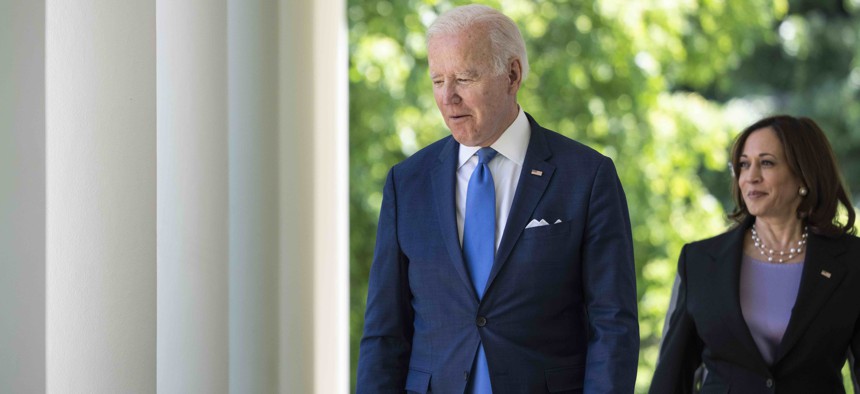Internet Service Essentially Free for Millions Under New Biden Program

Joe Biden and Vice President Kamala Harris walk to the Rose Garden for an event on high speed internet access for low-income Americans, at the White House May 9, 2022 in Washington, DC. The Biden administration announced on Monday that it will partner with internet service providers to lower the cost of high speed internet plans for low-income Americans as part of the Affordable Connectivity Program. Drew Angerer/Getty Images
With a discount already in place, 20 companies have agreed to offer service for $30 a month. Advocacy groups are hoping states will adopt similar pricing requirements.
President Biden announced Monday that he’s convinced 20 major broadband providers, like AT&T and Comcast, to offer low-cost high-speed internet plans for $30 a month or less. Combined with a $30 monthly discount lower-income people are already receiving through the Infrastructure Investment and Jobs Act, Biden said millions will be able to get online for free.
The president, whose popularity is being harmed by skyrocketing inflation and other worries about the economy, said the lower prices will “give millions of families a little more.”
Left-leaning consumer groups hailed the move. They also expressed hope that it is a sign the Commerce Department’s National Telecommunications and Information Administration will push states with broadband projects funded under the new federal infrastructure law to require more service providers to also lower their rates.
The Infrastructure Investment and Jobs Act required that states mandate that the broadband companies they contract with to upgrade service offer customers a “low-cost option.” Congress did not define what that means, leaving it up to states to decide. However, NTIA must approve how states define “low-cost” before allocating broadband dollars available through the law.
Greg Guice, government relations director for the advocacy group Public Knowledge, said he hoped NTIA will point to Biden’s announcement and tell states to require companies to offer broadband service for certain groups, like lower-income households and seniors, at no more than $30 a month.
The broadband industry has opposed NTIA specifying price requirements for states to follow, calling it rate-setting and government overreach.
Biden and Vice President Kamala Harris said the Covid-19 pandemic has highlighted the importance of families being able to get online.
“The need for high-speed internet is pretty much the same way my grandfather talked about the importance of the telephone—pretty consequential,” Biden said. “High-speed internet isn’t a luxury anymore, it's a necessity.”
Lower income people are less likely to have high-speed internet at home, which on average costs between $50 to nearly $70-a-month, according to The Pew Charitable Trusts.
A study by The Pew Research Center last year found that among those with incomes of $75,000, only 8% of adults do not have home internet. In contrast, 43% of adults with annual household incomes less than $30,000 lack service at home.
Guice noted that the lower prices Biden announced are voluntary and companies could raise them at any time.
And Chris Lewis, president and CEO of Public Knowledge, said in a statement that the administration needs to do more to lower prices, including for those who don’t qualify for the monthly discounts.
“This is a short-term win when Americans need bolder action from their policymakers to ensure affordable broadband in the future,” Lewis said.
“Almost a year and a half into this administration, we continue to have no oversight of competition and pricing in the broadband market by Congress or at the expert agency on communications networks, the [Federal Communications Commission],” he added.
The lower prices will essentially make internet service free for those who qualify for the $14.2 billion Affordable Connectivity Program created in the infrastructure act, which gives those who make 200% or less of the federal poverty level a $30 monthly discount.
Households can also qualify for the IIJA discount program if they are eligible for other federal assistance, including the Supplemental Nutrition Aid Program, public housing, or Medicaid.
About 11.5 million people have signed up for the Affordable Connectivity Program discounts. While it’s not known precisely how many families will benefit from the initiative lowering prices, the White House said the 20 companies serve about 80% of Americans and pointed to an estimate indicating that 48 million households could qualify for the discount program created by the infrastructure law.
[For a list of the companies participating in the new pricing initiative, see the White House’s fact sheet].
As part of the effort, the administration says it is partnering with cities and states to spread the word about the discounts. Michigan, Massachusetts, Philadelphia, Mesa, Arizona, and New York City will text millions of eligible households, a White House fact sheet said.
The effort to lower prices was hailed by the National Association of Counties. “High-speed internet is a necessity that expands opportunities for all residents to thrive,” NACo President Larry Johnson, a commissioner in DeKalb County, Georgia, said in a statement. “Today’s announcement aims to bring all stakeholders together to help connect some of our most disconnected communities.”
Kery Murakami is a senior reporter for Route Fifty.
NEXT STORY: Freight Advocates Push for a Share of $18B in Grant Funding






